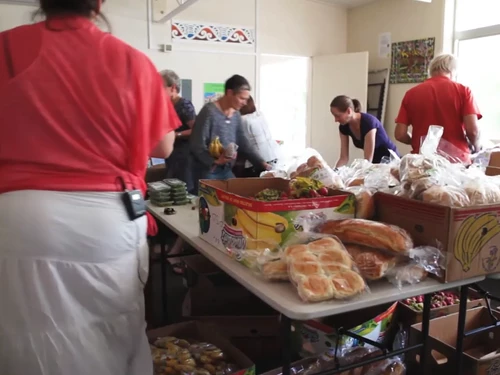




Kai Share – Weaving community connections
James Sutherland, a 2024 participant in Inspiring Communities’ Micro-Credential in Community-Led Development (CLD) Facilitation, put his learning into action by leading a grassroots governance review of the Kai Share programme in Dunedin. Through collaboration, trust-building, and a te ao Māori approach, he helped restore its kaupapa and empower the community to lead change.
James Sutherland serves as a volunteer and Chair of the Executive for The Valley Project, a community-led development (CLD) organisation in Ōtepoti, Dunedin. His role is focused on grassroots governance and addressing community needs such as food insecurity, health, and fostering a strong sense of connection.
I got involved as a new resident to the Valley while studying at university. I wanted to give back to the community, so I joined the Executive. Through my experience on boards in mental health and social services, I’ve worked to ensure people feel heard and their views are incorporated into decision-making. One such example is the Kai Share programme, which needed to be reviewed after it drifted away from its kaupapa during the COVID pandemic.
Kai Share: Listening and Engaging the Community
Kai Share began as a community-led initiative, but during COVID, it shifted to a disconnected model, losing its grassroots essence and creating barriers to access for those most in need. When I became Chair in 2022, I prioritised strengthening our organisation internally so we could better support the community externally. This included a review of Kai Share to ensure it reflected our kaupapa, reduced barriers to entry, and aligned with te ao Māori values.
I formed a core group to lead the review, including Kai Share participants, volunteers, and staff. We had limited trust with the volunteers and participants due to the breakdown of communication during COVID, so my focus was to rebuild relationships and involve the community in shaping the programme.
I started by having formal and informal conversations with volunteers to understand the programme’s challenges. We identified that participants needed more wrap-around support, such as connecting with social services or translation help for those with English as a second language. This insight guided the facilitation of change.

Applying CLD Principles: Collaborative Governance
The Valley Project operates on key values:
- Care: Caring for our community and environment through community-led change.
- Collaboration: Working with individuals and groups for collective benefit.
- Wellbeing: Enhancing community quality of life.
- Welcoming: Embracing all walks of life and cultures with a te ao Māori approach.
These values underpinned the Kai Share review process. I established the Kai Share Action Komiti, made up of executive members, staff, volunteers, participants, and key stakeholders, including mana whenua, single parents, and refugees. The komiti met every three weeks to develop a shared vision for the programme.
Meetings followed a structured but flexible agenda that included karakia, updates, and breakout discussions to address governance and operational issues.
I ensured everyone’s voice was heard by creating spaces for quieter members to share their ideas and allowing dominant personalities to challenge each other constructively. This balance helped us reach consensus and incorporate diverse perspectives into our decisions.
Adapting to Challenges
The process wasn’t without its challenges. Power imbalances, logistical issues, and strong personalities required careful facilitation. I found that group activities, such as breaking into smaller teams, helped mitigate these dynamics.
Another challenge was ensuring safety for volunteers, as they sometimes faced threatening behaviour. I swiftly implemented a ‘Conduct’ poster and created volunteer contracts to set clear boundaries and improve wellbeing. Although this decision was made without full Executive approval, it was necessary for immediate safety. The response was overwhelmingly positive, and it reinforced the importance of prioritising volunteer safety.
Empowering the Community
The komiti adopted a holistic, te ao Māori approach, recognising the interconnectedness of community wellbeing. We designed demographic forms to tailor support services, linking participants to budgeting services, community gardens, and translators. These changes aimed to reduce dependency on Kai Share while addressing the root causes of food insecurity.
Community members brought passion and commitment to the process. By going back to their networks for feedback, they ensured the programme’s redesign reflected the voices of the Valley. The new model focused on supporting locals, fostering grassroots, community-led spirit.

Reflections and Learnings
I tend not to think of myself as a great facilitator, it’s the people in the group who make it a success. However, the feedback I’ve received has been humbling. It’s shown me that I’ve been able to work collaboratively to create meaningful change.
Key learnings include:
- Building trust and relationships is vital for rapid progress.
- Facilitating consensus requires balancing diverse voices and managing power dynamics.
- A te ao Māori approach enhances wellbeing and strengthens community connections.
Working with the community has been rewarding. The programme reset in just four months, and we’ve returned to a truly community-led model. The skills I’ve gained in CLD facilitation have made me a better leader and taught me the importance of learning by doing.
Looking Ahead
This is just the beginning of my CLD journey. I plan to deepen my understanding of our community’s history and demographics to better support future initiatives. I’ve also started a CLD Chair’s Hui in Dunedin, bringing together leaders from other programmes to share facilitation skills and build stronger partnerships.
CLD has taught me that my role as a facilitator is to bring together the flax leaves to weave the basket of support for our community. Kai Share is a testament to what we can achieve when we work together, and I’m excited to see where this journey takes us next.
This case study is drawn from James Sutherland’s mahi over the course of the Micro-Credential in Community-Led Development (CLD) Facilitation. Shared in his own words, it has been lightly edited by Inspiring Communities for clarity and to suit a blog format while staying true to his experience and insights.
